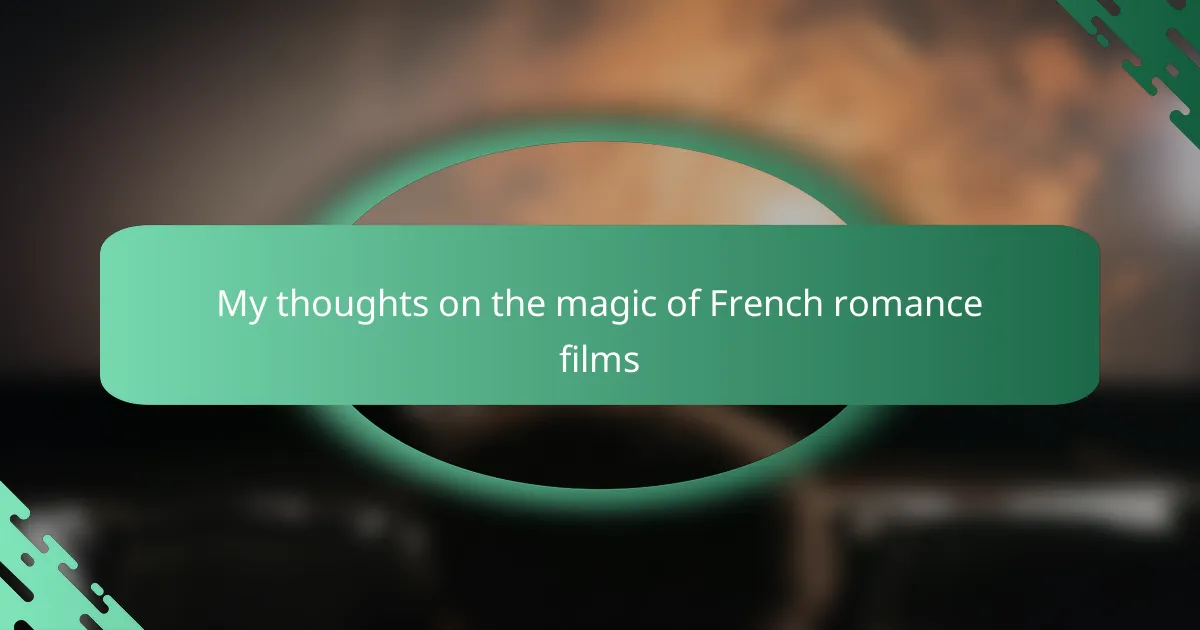Key takeaways
- French romance films focus on deep character development and emotional authenticity, emphasizing complex, often bittersweet themes.
- These films intertwine everyday life with poetic storytelling, often showcasing love found in unexpected places.
- Notable works like “Amélie,” “The Umbrellas of Cherbourg,” and “Blue Is the Warmest Color” highlight the beauty and challenges of love.
- Cinematic techniques such as close-ups, color palettes, and evocative soundtracks enhance the emotional experience for viewers.
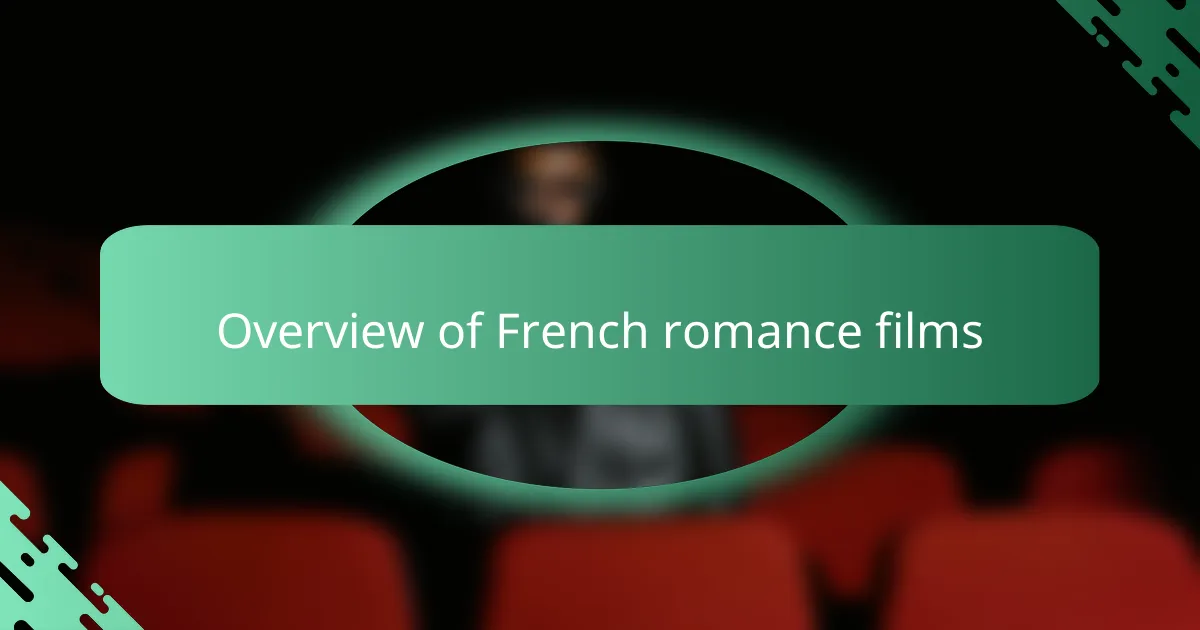
Overview of French romance films
French romance films possess a unique charm that sets them apart from other cinematic traditions. They often delve into the complexities of love, exploring not only the highs of romance but also the bittersweet moments. Personally, I’ve found these films to have a poetic quality, drawing viewers into the characters’ emotional journeys in a way that feels deeply relatable.
One key aspect of French romance films is their emphasis on character development. I’ve noticed that filmmakers often prioritize nuanced storytelling over action-driven plots, allowing audiences to form a genuine connection with the characters. The romance in these films is not just about the love story; it’s also about the cultural backdrop, which adds depth to the narrative.
In comparing French romance films to their American counterparts, one can observe notable differences in style, pacing, and thematic exploration. While American films tend to lean heavily on happy endings and grand gestures, French movies often embrace ambiguity and realism, which resonates profoundly with viewers seeking authenticity.
| Aspect | French Romance Films | American Romance Films |
|---|---|---|
| Themes | Complex, often bittersweet | Idealistic, often happy |
| Pacing | Slow, reflective | Fast, plot-driven |
| Character Focus | Deep development | Often surface-level |
| Cultural Context | Richly woven | Less emphasis |
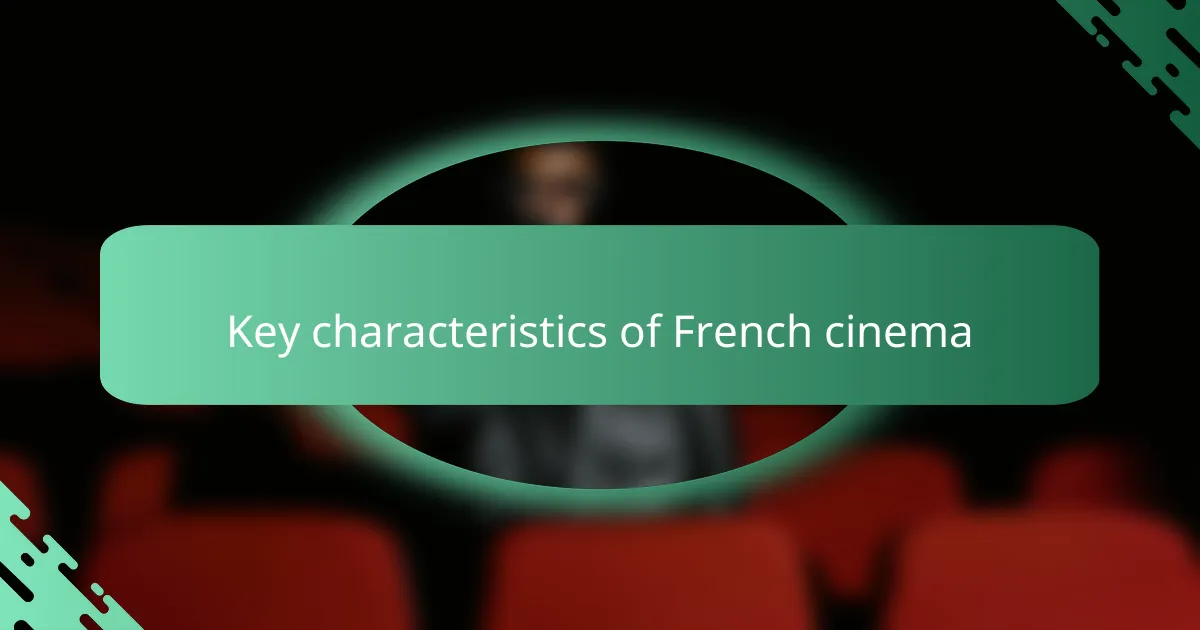
Key characteristics of French cinema
French cinema often encapsulates a unique blend of charm and realism. What I love about these films is their ability to intertwine everyday life with poetic storytelling. There’s something profoundly relatable about characters who find love in the most unexpected places, often emphasizing emotional depth over grand gestures.
In my experience, the magic of French films lies in their key characteristics:
- Naturalism: They often depict real-life situations, portraying characters that feel authentic and relatable.
- Romanticism: Love is explored deeply, sometimes with a bittersweet twist rather than a conventional happy ending.
- Cinematography: Visually stunning, many films like “Amélie” capture the essence of French culture through vibrant colors and whimsical framing.
- Character Development: Characters are allowed to evolve gradually, making their journeys feel genuine and impactful.
- Humor and Wit: There’s often a playful use of dialogue and situations, which adds a light-hearted touch to even the most serious themes.
Reflecting on my own viewing experiences, I find that these elements can evoke feelings of nostalgia and longing, reminding me of my own moments of romance and adventure.
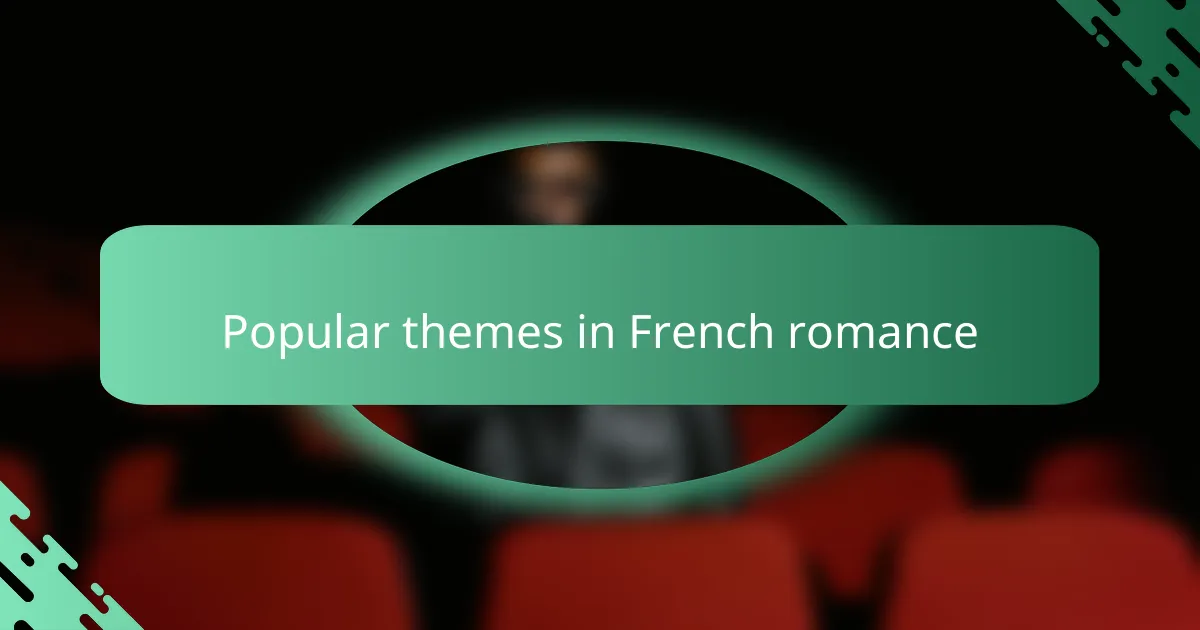
Popular themes in French romance
When I think of French romance films, certain themes seem to emerge consistently, weaving a rich tapestry of love and longing. One prevalent theme is the exploration of unrequited love, showcasing the bittersweet nature of affection that is not reciprocated. I’ve often felt a deep connection with these narratives as they remind me of my own experiences of yearning for someone who didn’t quite feel the same way; it’s heart-wrenching yet profoundly relatable.
Another popular theme is the portrayal of fleeting moments—those brief encounters that leave a lasting impact. I still remember a scene from one of my favorite films, where a chance meeting between two strangers sparks an entire journey of emotion, illuminating how love can manifest in the most unexpected ways. This theme resonates with so many of us, reflecting the intensity of passion and the beauty of ephemeral connections.
- Unrequited love
- Fleeting encounters
- Second chances
- Cultural differences in love
- The impact of time on romance
- Love across generations
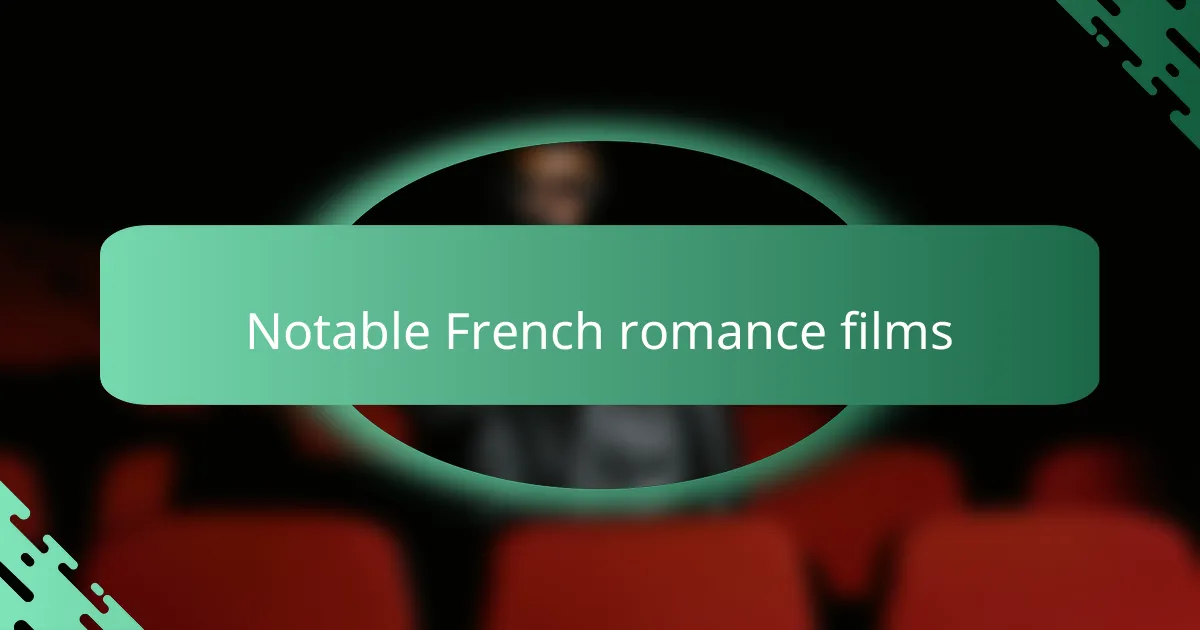
Notable French romance films
One standout in the realm of French romance films is “The Umbrellas of Cherbourg.” This film swept me off my feet with its vibrant visuals and sung-through dialogue, creating a uniquely emotional experience. The story illustrates a love that faces real-world hurdles, making me ponder: isn’t that what we can all relate to? The film’s bittersweet ending left a mark on me, reminding me that sometimes love doesn’t conquer all, but that doesn’t diminish its beauty.
Then there’s “Blue Is the Warmest Color,” which I found to be a profound exploration of love and identity. This film doesn’t shy away from deep emotions, and the rawness of the relationship between the two main characters had me reflecting on my own romantic journeys. The way it captures both the ecstasy and turmoil of love is simply unforgettable, and it made me realize how vital it is to embrace all facets of our relationships, even the challenging ones.
Finally, “Amélie” holds a special place in my heart not just for its whimsical storytelling, but for its celebration of life’s small pleasures. It’s incredible how a film can make you feel so connected to the character’s joy and longing for connection. I often think about those moments in life that seem ordinary yet carry extraordinary significance—much like Amélie’s charming adventures in Paris. Such films remind me of the enchantment that exists in love, even amidst life’s chaos.
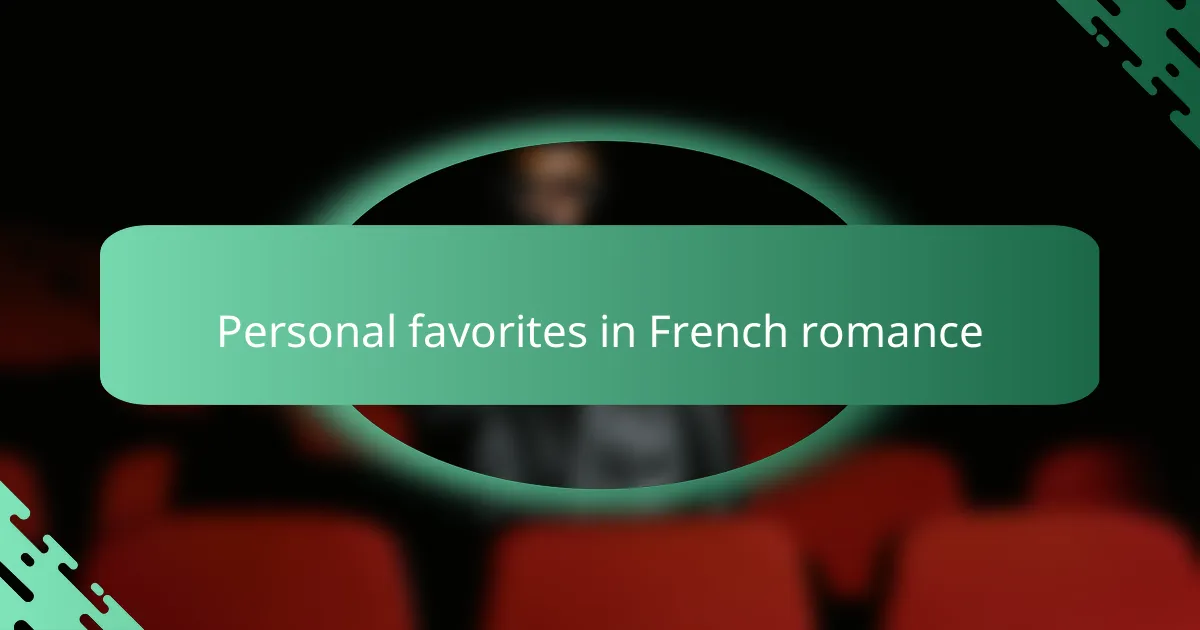
Personal favorites in French romance
When it comes to French romance films, I can’t help but feel a special connection to “Amélie.” The whimsical storytelling and charming Parisian backdrop have a way of drawing me in, making me feel both nostalgic and hopeful. I remember watching it for the first time on a rainy afternoon, and by the end, my heart was filled with joy and a desire to see beauty in the little things.
Another standout for me is “The Artist.” Though it’s mostly silent, the emotions conveyed through the performances are incredibly powerful. I was surprised at how deeply I felt for the characters despite the lack of dialogue. It’s a perfect reminder that love transcends words, and the magic of cinema can speak volumes.
Here’s a list of my personal favorites that embody the enchanting spirit of French romance:
- Amélie (Le Fabuleux Destin d’Amélie Poulain)
- The Artist
- Blue Is the Warmest Color (La Vie d’Adèle)
- A Very Long Engagement (Un long dimanche de fiançailles)
- La La Land (though technically American, it captures a French romance essence)
- The Umbrellas of Cherbourg (Les Parapluies de Cherbourg)
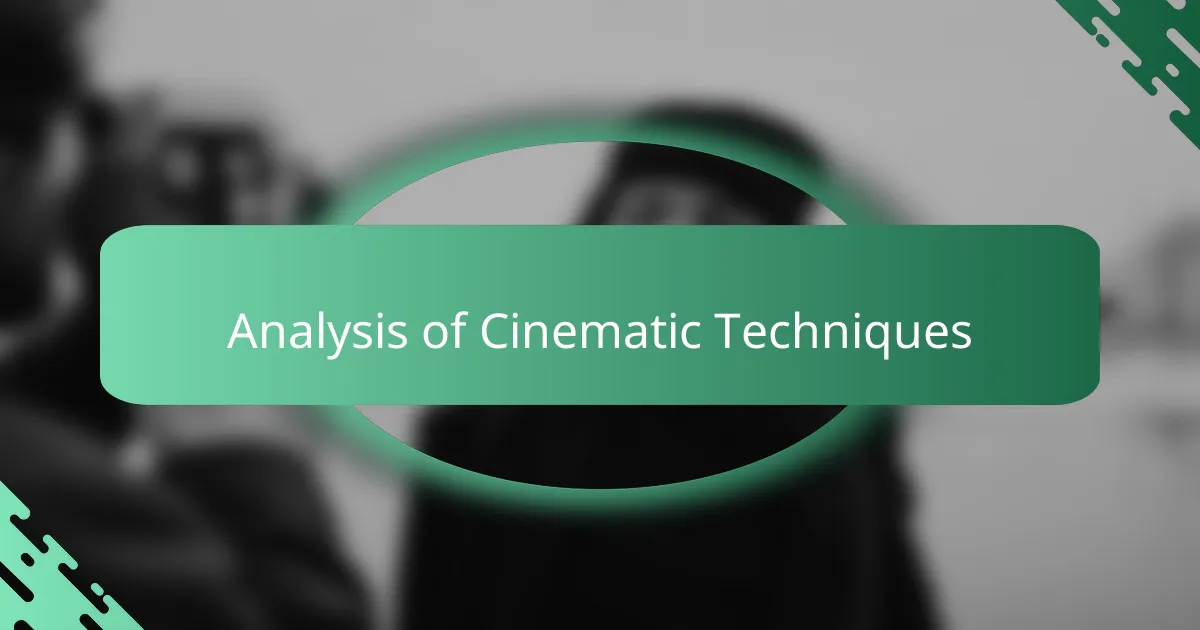
Analysis of cinematic techniques
French romance films often employ cinematic techniques that enhance the emotional resonance of their stories. For instance, I’m always struck by the use of close-ups; these shots draw me intimately into the characters’ emotions. It’s as if I can feel their joy, sorrow, and everything in between, making their journeys feel personal. A well-timed close-up has the power to convey a world of unspoken feelings.
Another standout technique is the thoughtful use of light and color. Films like “Amélie” showcase warm, vibrant palettes that evoke a sense of nostalgia and whimsy. In my own experience, I find that these colors not only illuminate the action but also set the mood and tone of the romance. They create an atmosphere that envelops the viewer, transporting us directly into the heart of the story.
Moreover, the soundtrack plays a pivotal role in French romance films, weaving seamlessly with the narrative. I often find myself captivated by how music accentuates pivotal moments, amplifying the emotional stakes. The melodies linger in my mind long after the credits roll, reminding me of the feelings I experienced during the film. Isn’t it fascinating how a score can heighten our connection to love stories?
